Organizational Behavior Report: A David Limited Unit 12 Analysis
VerifiedAdded on 2020/10/23
|16
|5098
|458
Report
AI Summary
This report provides a comprehensive analysis of organizational behavior, focusing on the influence of culture, power, and politics on individual and team behavior within A David Limited. It explores the impact of creative, collaborative, competitive, and controlled cultures on employees, as well as the effects of workplace politics and the use of power. The report also evaluates motivational techniques, including content and process theories, such as Maslow's hierarchy of needs and Herzberg's two-factor theory, to enhance goal achievement. Furthermore, it identifies factors that contribute to effective and ineffective teams, providing valuable insights into leadership and management practices. The report also discusses Hofstede's cultural dimensions and their implications for cross-cultural communication within the organization. The report emphasizes on how managers can use motivation theories to improve employee performance and foster a positive work environment.
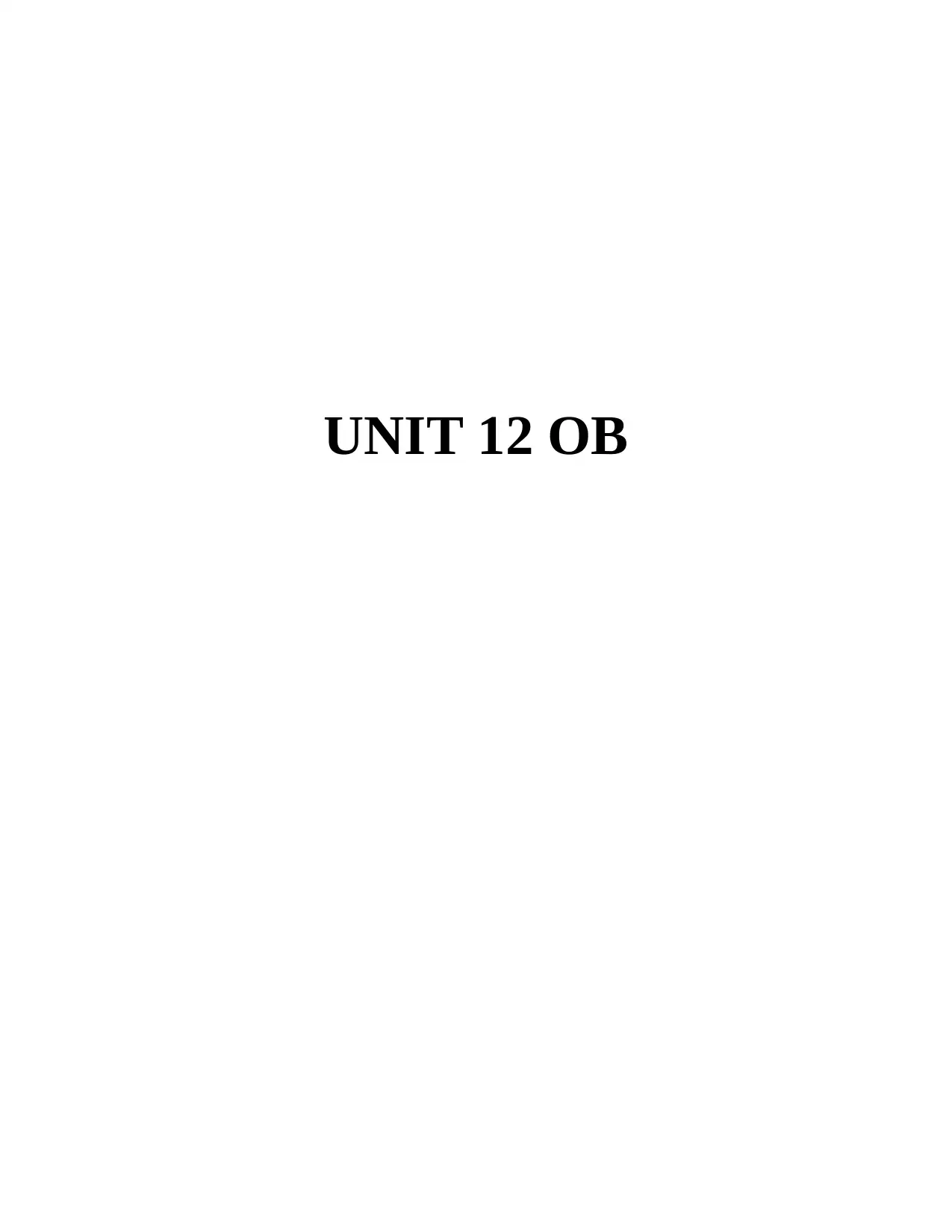
UNIT 12 OB
Paraphrase This Document
Need a fresh take? Get an instant paraphrase of this document with our AI Paraphraser
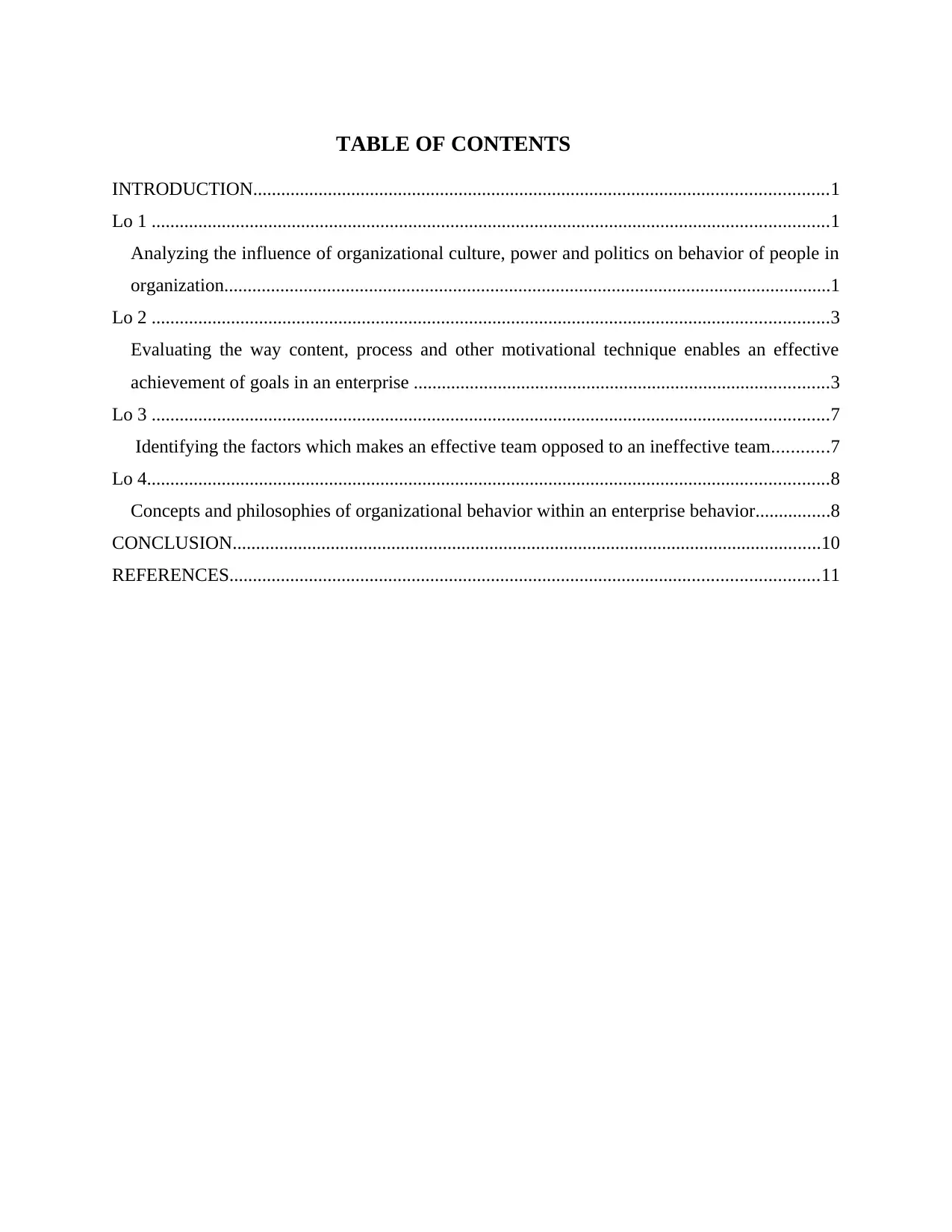
TABLE OF CONTENTS
INTRODUCTION...........................................................................................................................1
Lo 1 .................................................................................................................................................1
Analyzing the influence of organizational culture, power and politics on behavior of people in
organization..................................................................................................................................1
Lo 2 .................................................................................................................................................3
Evaluating the way content, process and other motivational technique enables an effective
achievement of goals in an enterprise .........................................................................................3
Lo 3 .................................................................................................................................................7
Identifying the factors which makes an effective team opposed to an ineffective team............7
Lo 4..................................................................................................................................................8
Concepts and philosophies of organizational behavior within an enterprise behavior................8
CONCLUSION..............................................................................................................................10
REFERENCES..............................................................................................................................11
INTRODUCTION...........................................................................................................................1
Lo 1 .................................................................................................................................................1
Analyzing the influence of organizational culture, power and politics on behavior of people in
organization..................................................................................................................................1
Lo 2 .................................................................................................................................................3
Evaluating the way content, process and other motivational technique enables an effective
achievement of goals in an enterprise .........................................................................................3
Lo 3 .................................................................................................................................................7
Identifying the factors which makes an effective team opposed to an ineffective team............7
Lo 4..................................................................................................................................................8
Concepts and philosophies of organizational behavior within an enterprise behavior................8
CONCLUSION..............................................................................................................................10
REFERENCES..............................................................................................................................11
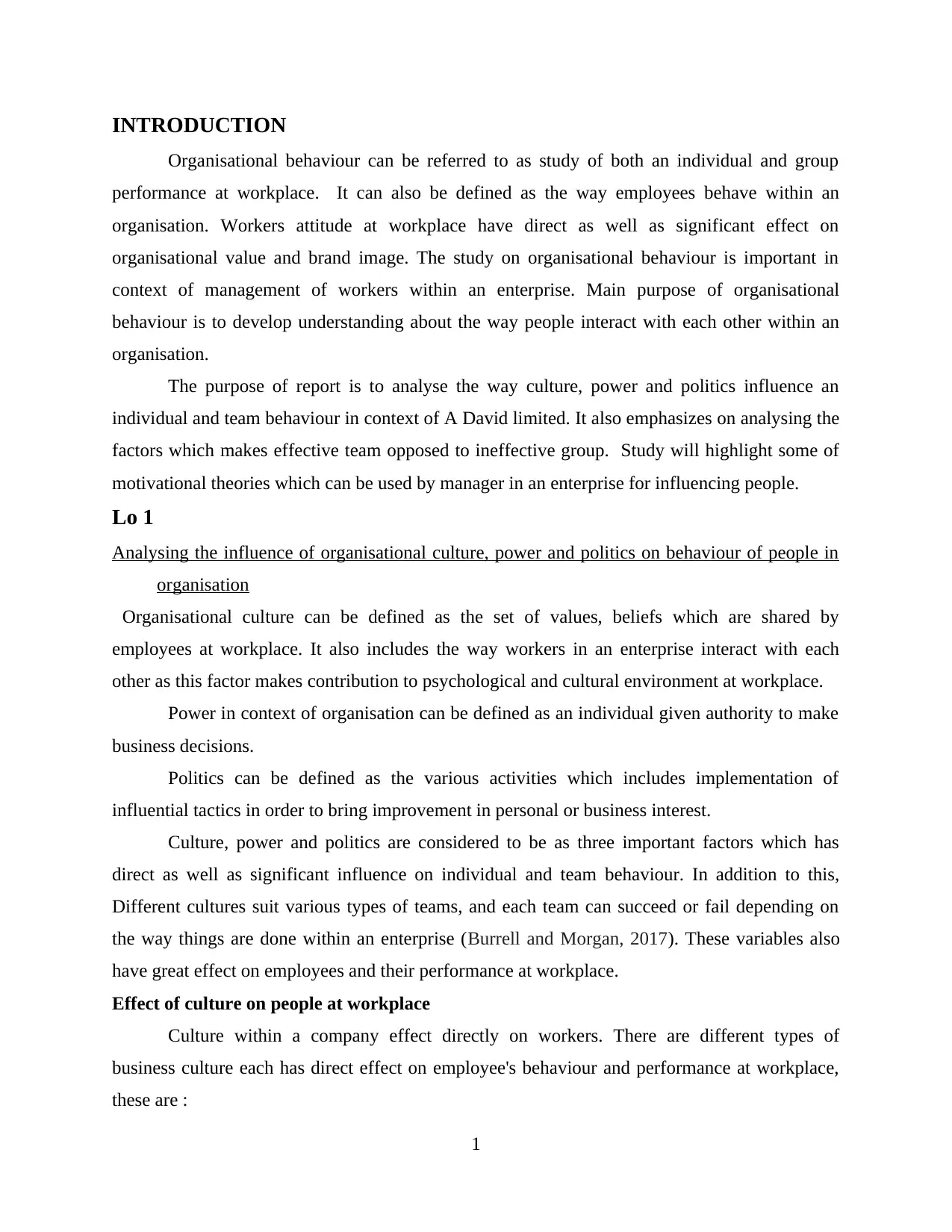
INTRODUCTION
Organisational behaviour can be referred to as study of both an individual and group
performance at workplace. It can also be defined as the way employees behave within an
organisation. Workers attitude at workplace have direct as well as significant effect on
organisational value and brand image. The study on organisational behaviour is important in
context of management of workers within an enterprise. Main purpose of organisational
behaviour is to develop understanding about the way people interact with each other within an
organisation.
The purpose of report is to analyse the way culture, power and politics influence an
individual and team behaviour in context of A David limited. It also emphasizes on analysing the
factors which makes effective team opposed to ineffective group. Study will highlight some of
motivational theories which can be used by manager in an enterprise for influencing people.
Lo 1
Analysing the influence of organisational culture, power and politics on behaviour of people in
organisation
Organisational culture can be defined as the set of values, beliefs which are shared by
employees at workplace. It also includes the way workers in an enterprise interact with each
other as this factor makes contribution to psychological and cultural environment at workplace.
Power in context of organisation can be defined as an individual given authority to make
business decisions.
Politics can be defined as the various activities which includes implementation of
influential tactics in order to bring improvement in personal or business interest.
Culture, power and politics are considered to be as three important factors which has
direct as well as significant influence on individual and team behaviour. In addition to this,
Different cultures suit various types of teams, and each team can succeed or fail depending on
the way things are done within an enterprise (Burrell and Morgan, 2017). These variables also
have great effect on employees and their performance at workplace.
Effect of culture on people at workplace
Culture within a company effect directly on workers. There are different types of
business culture each has direct effect on employee's behaviour and performance at workplace,
these are :
1
Organisational behaviour can be referred to as study of both an individual and group
performance at workplace. It can also be defined as the way employees behave within an
organisation. Workers attitude at workplace have direct as well as significant effect on
organisational value and brand image. The study on organisational behaviour is important in
context of management of workers within an enterprise. Main purpose of organisational
behaviour is to develop understanding about the way people interact with each other within an
organisation.
The purpose of report is to analyse the way culture, power and politics influence an
individual and team behaviour in context of A David limited. It also emphasizes on analysing the
factors which makes effective team opposed to ineffective group. Study will highlight some of
motivational theories which can be used by manager in an enterprise for influencing people.
Lo 1
Analysing the influence of organisational culture, power and politics on behaviour of people in
organisation
Organisational culture can be defined as the set of values, beliefs which are shared by
employees at workplace. It also includes the way workers in an enterprise interact with each
other as this factor makes contribution to psychological and cultural environment at workplace.
Power in context of organisation can be defined as an individual given authority to make
business decisions.
Politics can be defined as the various activities which includes implementation of
influential tactics in order to bring improvement in personal or business interest.
Culture, power and politics are considered to be as three important factors which has
direct as well as significant influence on individual and team behaviour. In addition to this,
Different cultures suit various types of teams, and each team can succeed or fail depending on
the way things are done within an enterprise (Burrell and Morgan, 2017). These variables also
have great effect on employees and their performance at workplace.
Effect of culture on people at workplace
Culture within a company effect directly on workers. There are different types of
business culture each has direct effect on employee's behaviour and performance at workplace,
these are :
1
⊘ This is a preview!⊘
Do you want full access?
Subscribe today to unlock all pages.

Trusted by 1+ million students worldwide
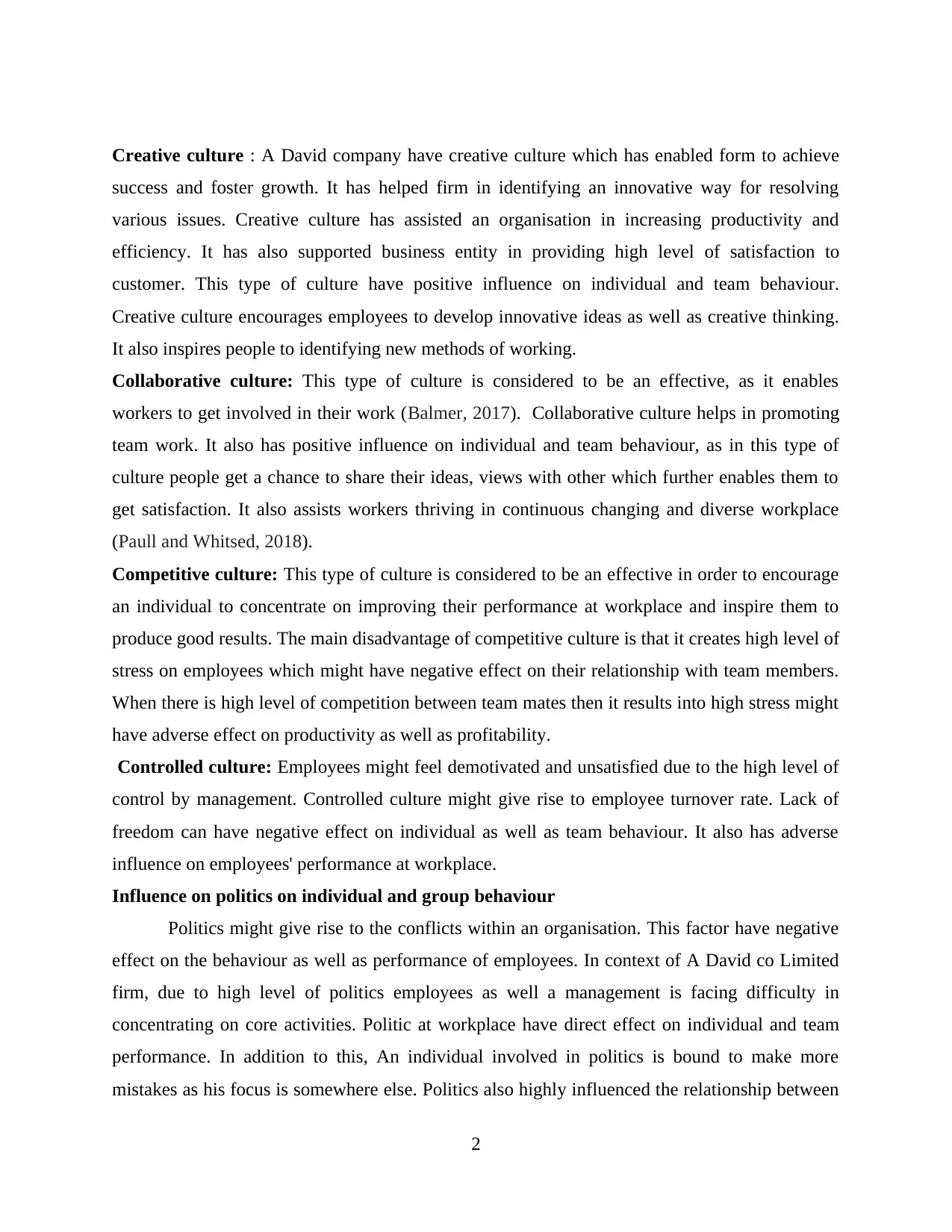
Creative culture : A David company have creative culture which has enabled form to achieve
success and foster growth. It has helped firm in identifying an innovative way for resolving
various issues. Creative culture has assisted an organisation in increasing productivity and
efficiency. It has also supported business entity in providing high level of satisfaction to
customer. This type of culture have positive influence on individual and team behaviour.
Creative culture encourages employees to develop innovative ideas as well as creative thinking.
It also inspires people to identifying new methods of working.
Collaborative culture: This type of culture is considered to be an effective, as it enables
workers to get involved in their work (Balmer, 2017). Collaborative culture helps in promoting
team work. It also has positive influence on individual and team behaviour, as in this type of
culture people get a chance to share their ideas, views with other which further enables them to
get satisfaction. It also assists workers thriving in continuous changing and diverse workplace
(Paull and Whitsed, 2018).
Competitive culture: This type of culture is considered to be an effective in order to encourage
an individual to concentrate on improving their performance at workplace and inspire them to
produce good results. The main disadvantage of competitive culture is that it creates high level of
stress on employees which might have negative effect on their relationship with team members.
When there is high level of competition between team mates then it results into high stress might
have adverse effect on productivity as well as profitability.
Controlled culture: Employees might feel demotivated and unsatisfied due to the high level of
control by management. Controlled culture might give rise to employee turnover rate. Lack of
freedom can have negative effect on individual as well as team behaviour. It also has adverse
influence on employees' performance at workplace.
Influence on politics on individual and group behaviour
Politics might give rise to the conflicts within an organisation. This factor have negative
effect on the behaviour as well as performance of employees. In context of A David co Limited
firm, due to high level of politics employees as well a management is facing difficulty in
concentrating on core activities. Politic at workplace have direct effect on individual and team
performance. In addition to this, An individual involved in politics is bound to make more
mistakes as his focus is somewhere else. Politics also highly influenced the relationship between
2
success and foster growth. It has helped firm in identifying an innovative way for resolving
various issues. Creative culture has assisted an organisation in increasing productivity and
efficiency. It has also supported business entity in providing high level of satisfaction to
customer. This type of culture have positive influence on individual and team behaviour.
Creative culture encourages employees to develop innovative ideas as well as creative thinking.
It also inspires people to identifying new methods of working.
Collaborative culture: This type of culture is considered to be an effective, as it enables
workers to get involved in their work (Balmer, 2017). Collaborative culture helps in promoting
team work. It also has positive influence on individual and team behaviour, as in this type of
culture people get a chance to share their ideas, views with other which further enables them to
get satisfaction. It also assists workers thriving in continuous changing and diverse workplace
(Paull and Whitsed, 2018).
Competitive culture: This type of culture is considered to be an effective in order to encourage
an individual to concentrate on improving their performance at workplace and inspire them to
produce good results. The main disadvantage of competitive culture is that it creates high level of
stress on employees which might have negative effect on their relationship with team members.
When there is high level of competition between team mates then it results into high stress might
have adverse effect on productivity as well as profitability.
Controlled culture: Employees might feel demotivated and unsatisfied due to the high level of
control by management. Controlled culture might give rise to employee turnover rate. Lack of
freedom can have negative effect on individual as well as team behaviour. It also has adverse
influence on employees' performance at workplace.
Influence on politics on individual and group behaviour
Politics might give rise to the conflicts within an organisation. This factor have negative
effect on the behaviour as well as performance of employees. In context of A David co Limited
firm, due to high level of politics employees as well a management is facing difficulty in
concentrating on core activities. Politic at workplace have direct effect on individual and team
performance. In addition to this, An individual involved in politics is bound to make more
mistakes as his focus is somewhere else. Politics also highly influenced the relationship between
2
Paraphrase This Document
Need a fresh take? Get an instant paraphrase of this document with our AI Paraphraser
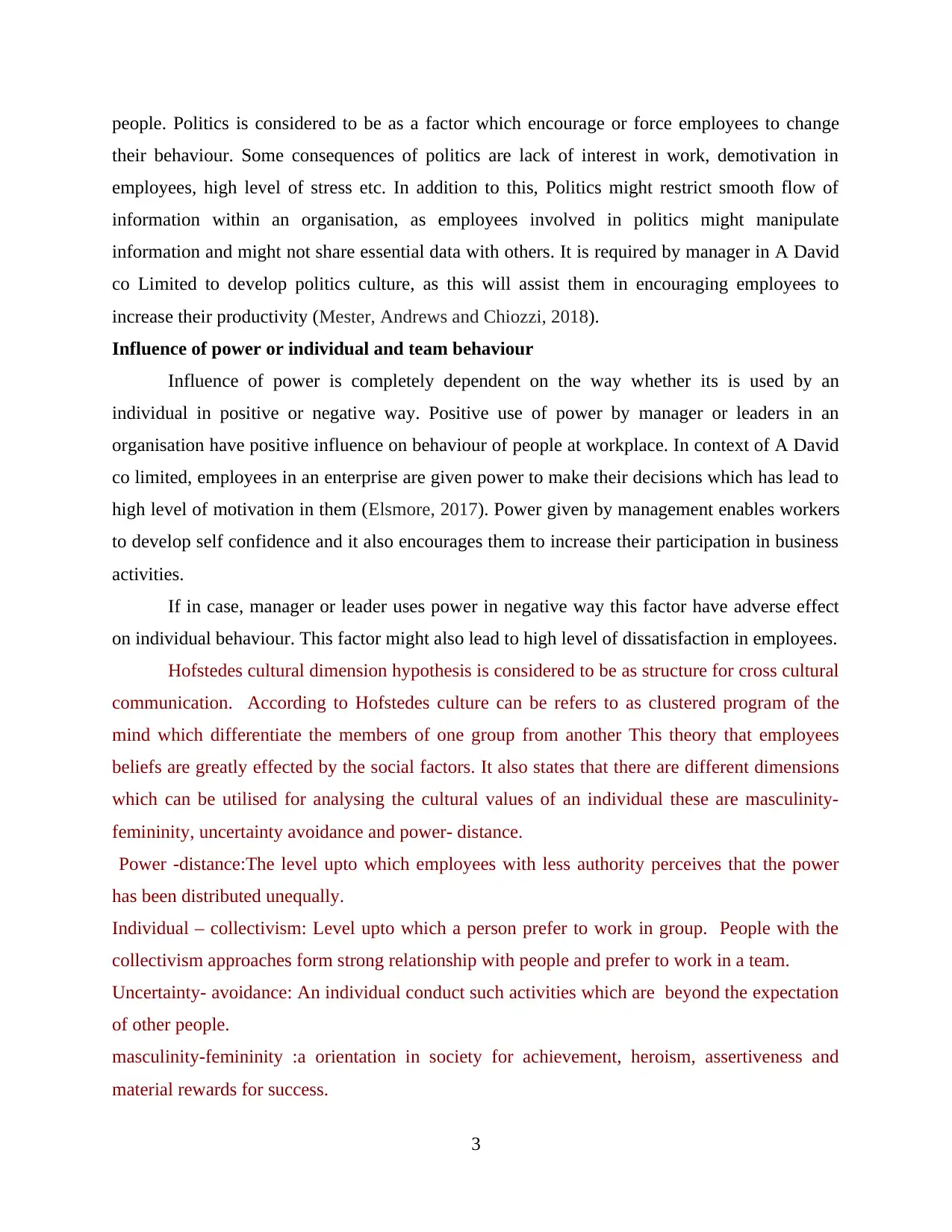
people. Politics is considered to be as a factor which encourage or force employees to change
their behaviour. Some consequences of politics are lack of interest in work, demotivation in
employees, high level of stress etc. In addition to this, Politics might restrict smooth flow of
information within an organisation, as employees involved in politics might manipulate
information and might not share essential data with others. It is required by manager in A David
co Limited to develop politics culture, as this will assist them in encouraging employees to
increase their productivity (Mester, Andrews and Chiozzi, 2018).
Influence of power or individual and team behaviour
Influence of power is completely dependent on the way whether its is used by an
individual in positive or negative way. Positive use of power by manager or leaders in an
organisation have positive influence on behaviour of people at workplace. In context of A David
co limited, employees in an enterprise are given power to make their decisions which has lead to
high level of motivation in them (Elsmore, 2017). Power given by management enables workers
to develop self confidence and it also encourages them to increase their participation in business
activities.
If in case, manager or leader uses power in negative way this factor have adverse effect
on individual behaviour. This factor might also lead to high level of dissatisfaction in employees.
Hofstedes cultural dimension hypothesis is considered to be as structure for cross cultural
communication. According to Hofstedes culture can be refers to as clustered program of the
mind which differentiate the members of one group from another This theory that employees
beliefs are greatly effected by the social factors. It also states that there are different dimensions
which can be utilised for analysing the cultural values of an individual these are masculinity-
femininity, uncertainty avoidance and power- distance.
Power -distance:The level upto which employees with less authority perceives that the power
has been distributed unequally.
Individual – collectivism: Level upto which a person prefer to work in group. People with the
collectivism approaches form strong relationship with people and prefer to work in a team.
Uncertainty- avoidance: An individual conduct such activities which are beyond the expectation
of other people.
masculinity-femininity :a orientation in society for achievement, heroism, assertiveness and
material rewards for success.
3
their behaviour. Some consequences of politics are lack of interest in work, demotivation in
employees, high level of stress etc. In addition to this, Politics might restrict smooth flow of
information within an organisation, as employees involved in politics might manipulate
information and might not share essential data with others. It is required by manager in A David
co Limited to develop politics culture, as this will assist them in encouraging employees to
increase their productivity (Mester, Andrews and Chiozzi, 2018).
Influence of power or individual and team behaviour
Influence of power is completely dependent on the way whether its is used by an
individual in positive or negative way. Positive use of power by manager or leaders in an
organisation have positive influence on behaviour of people at workplace. In context of A David
co limited, employees in an enterprise are given power to make their decisions which has lead to
high level of motivation in them (Elsmore, 2017). Power given by management enables workers
to develop self confidence and it also encourages them to increase their participation in business
activities.
If in case, manager or leader uses power in negative way this factor have adverse effect
on individual behaviour. This factor might also lead to high level of dissatisfaction in employees.
Hofstedes cultural dimension hypothesis is considered to be as structure for cross cultural
communication. According to Hofstedes culture can be refers to as clustered program of the
mind which differentiate the members of one group from another This theory that employees
beliefs are greatly effected by the social factors. It also states that there are different dimensions
which can be utilised for analysing the cultural values of an individual these are masculinity-
femininity, uncertainty avoidance and power- distance.
Power -distance:The level upto which employees with less authority perceives that the power
has been distributed unequally.
Individual – collectivism: Level upto which a person prefer to work in group. People with the
collectivism approaches form strong relationship with people and prefer to work in a team.
Uncertainty- avoidance: An individual conduct such activities which are beyond the expectation
of other people.
masculinity-femininity :a orientation in society for achievement, heroism, assertiveness and
material rewards for success.
3
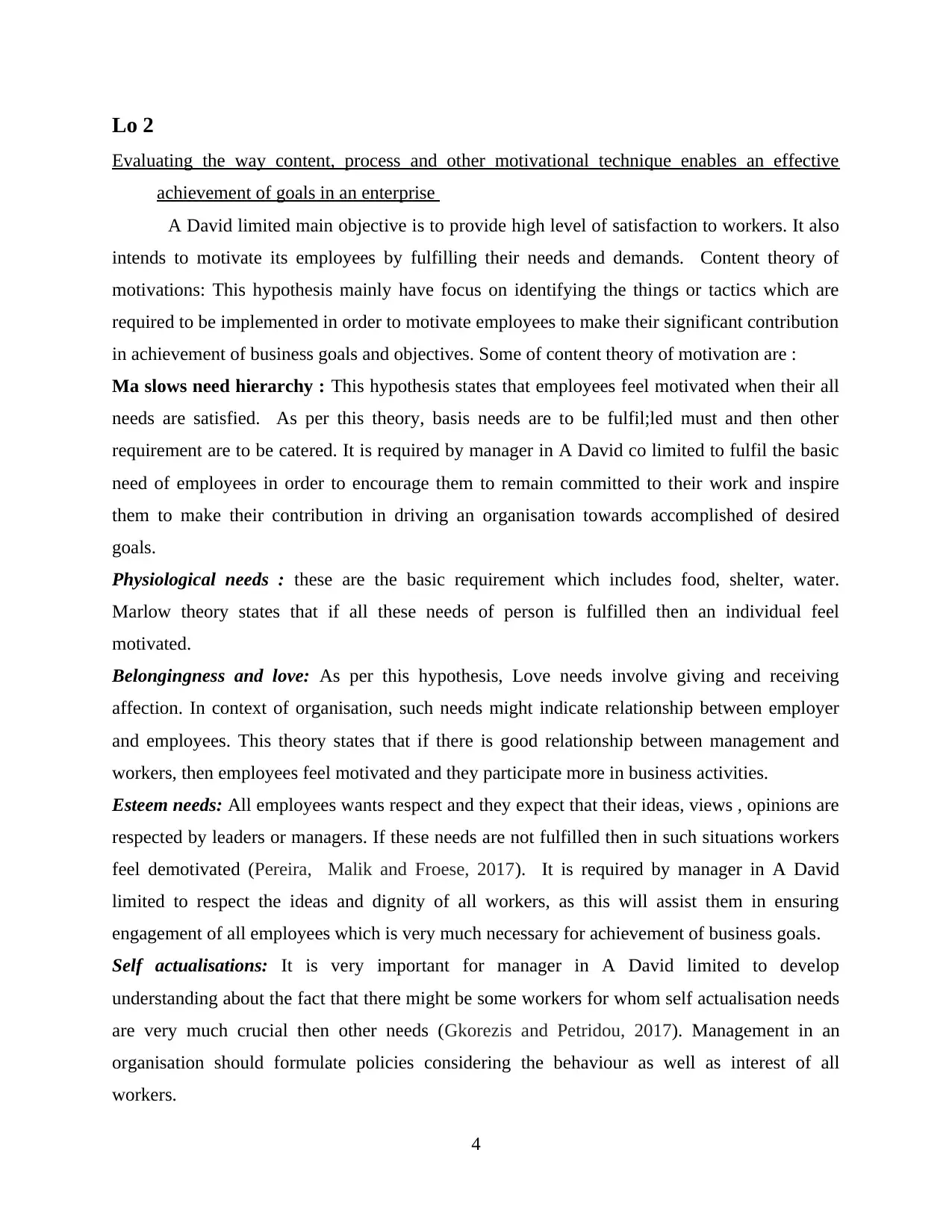
Lo 2
Evaluating the way content, process and other motivational technique enables an effective
achievement of goals in an enterprise
A David limited main objective is to provide high level of satisfaction to workers. It also
intends to motivate its employees by fulfilling their needs and demands. Content theory of
motivations: This hypothesis mainly have focus on identifying the things or tactics which are
required to be implemented in order to motivate employees to make their significant contribution
in achievement of business goals and objectives. Some of content theory of motivation are :
Ma slows need hierarchy : This hypothesis states that employees feel motivated when their all
needs are satisfied. As per this theory, basis needs are to be fulfil;led must and then other
requirement are to be catered. It is required by manager in A David co limited to fulfil the basic
need of employees in order to encourage them to remain committed to their work and inspire
them to make their contribution in driving an organisation towards accomplished of desired
goals.
Physiological needs : these are the basic requirement which includes food, shelter, water.
Marlow theory states that if all these needs of person is fulfilled then an individual feel
motivated.
Belongingness and love: As per this hypothesis, Love needs involve giving and receiving
affection. In context of organisation, such needs might indicate relationship between employer
and employees. This theory states that if there is good relationship between management and
workers, then employees feel motivated and they participate more in business activities.
Esteem needs: All employees wants respect and they expect that their ideas, views , opinions are
respected by leaders or managers. If these needs are not fulfilled then in such situations workers
feel demotivated (Pereira, Malik and Froese, 2017). It is required by manager in A David
limited to respect the ideas and dignity of all workers, as this will assist them in ensuring
engagement of all employees which is very much necessary for achievement of business goals.
Self actualisations: It is very important for manager in A David limited to develop
understanding about the fact that there might be some workers for whom self actualisation needs
are very much crucial then other needs (Gkorezis and Petridou, 2017). Management in an
organisation should formulate policies considering the behaviour as well as interest of all
workers.
4
Evaluating the way content, process and other motivational technique enables an effective
achievement of goals in an enterprise
A David limited main objective is to provide high level of satisfaction to workers. It also
intends to motivate its employees by fulfilling their needs and demands. Content theory of
motivations: This hypothesis mainly have focus on identifying the things or tactics which are
required to be implemented in order to motivate employees to make their significant contribution
in achievement of business goals and objectives. Some of content theory of motivation are :
Ma slows need hierarchy : This hypothesis states that employees feel motivated when their all
needs are satisfied. As per this theory, basis needs are to be fulfil;led must and then other
requirement are to be catered. It is required by manager in A David co limited to fulfil the basic
need of employees in order to encourage them to remain committed to their work and inspire
them to make their contribution in driving an organisation towards accomplished of desired
goals.
Physiological needs : these are the basic requirement which includes food, shelter, water.
Marlow theory states that if all these needs of person is fulfilled then an individual feel
motivated.
Belongingness and love: As per this hypothesis, Love needs involve giving and receiving
affection. In context of organisation, such needs might indicate relationship between employer
and employees. This theory states that if there is good relationship between management and
workers, then employees feel motivated and they participate more in business activities.
Esteem needs: All employees wants respect and they expect that their ideas, views , opinions are
respected by leaders or managers. If these needs are not fulfilled then in such situations workers
feel demotivated (Pereira, Malik and Froese, 2017). It is required by manager in A David
limited to respect the ideas and dignity of all workers, as this will assist them in ensuring
engagement of all employees which is very much necessary for achievement of business goals.
Self actualisations: It is very important for manager in A David limited to develop
understanding about the fact that there might be some workers for whom self actualisation needs
are very much crucial then other needs (Gkorezis and Petridou, 2017). Management in an
organisation should formulate policies considering the behaviour as well as interest of all
workers.
4
⊘ This is a preview!⊘
Do you want full access?
Subscribe today to unlock all pages.

Trusted by 1+ million students worldwide
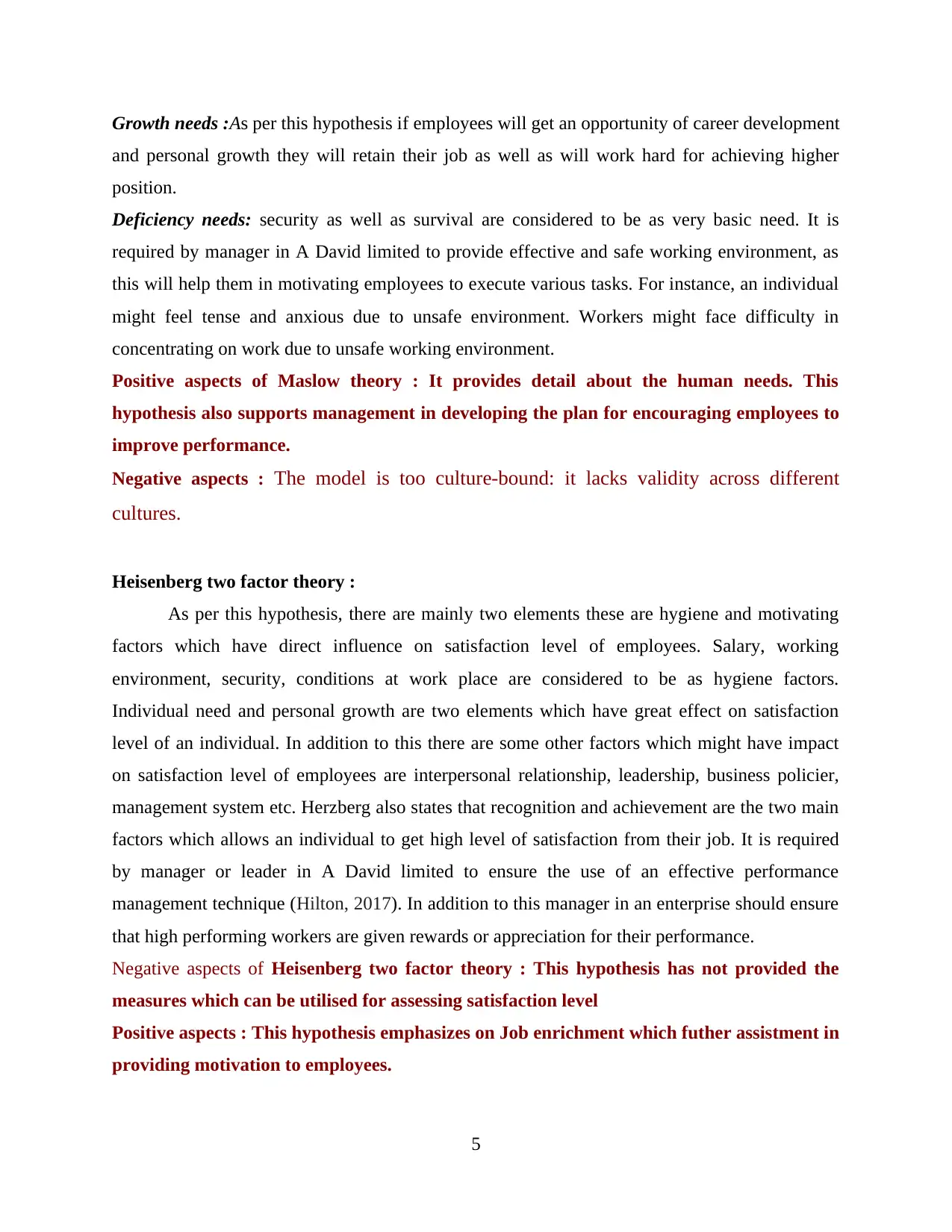
Growth needs :As per this hypothesis if employees will get an opportunity of career development
and personal growth they will retain their job as well as will work hard for achieving higher
position.
Deficiency needs: security as well as survival are considered to be as very basic need. It is
required by manager in A David limited to provide effective and safe working environment, as
this will help them in motivating employees to execute various tasks. For instance, an individual
might feel tense and anxious due to unsafe environment. Workers might face difficulty in
concentrating on work due to unsafe working environment.
Positive aspects of Maslow theory : It provides detail about the human needs. This
hypothesis also supports management in developing the plan for encouraging employees to
improve performance.
Negative aspects : The model is too culture-bound: it lacks validity across different
cultures.
Heisenberg two factor theory :
As per this hypothesis, there are mainly two elements these are hygiene and motivating
factors which have direct influence on satisfaction level of employees. Salary, working
environment, security, conditions at work place are considered to be as hygiene factors.
Individual need and personal growth are two elements which have great effect on satisfaction
level of an individual. In addition to this there are some other factors which might have impact
on satisfaction level of employees are interpersonal relationship, leadership, business policier,
management system etc. Herzberg also states that recognition and achievement are the two main
factors which allows an individual to get high level of satisfaction from their job. It is required
by manager or leader in A David limited to ensure the use of an effective performance
management technique (Hilton, 2017). In addition to this manager in an enterprise should ensure
that high performing workers are given rewards or appreciation for their performance.
Negative aspects of Heisenberg two factor theory : This hypothesis has not provided the
measures which can be utilised for assessing satisfaction level
Positive aspects : This hypothesis emphasizes on Job enrichment which futher assistment in
providing motivation to employees.
5
and personal growth they will retain their job as well as will work hard for achieving higher
position.
Deficiency needs: security as well as survival are considered to be as very basic need. It is
required by manager in A David limited to provide effective and safe working environment, as
this will help them in motivating employees to execute various tasks. For instance, an individual
might feel tense and anxious due to unsafe environment. Workers might face difficulty in
concentrating on work due to unsafe working environment.
Positive aspects of Maslow theory : It provides detail about the human needs. This
hypothesis also supports management in developing the plan for encouraging employees to
improve performance.
Negative aspects : The model is too culture-bound: it lacks validity across different
cultures.
Heisenberg two factor theory :
As per this hypothesis, there are mainly two elements these are hygiene and motivating
factors which have direct influence on satisfaction level of employees. Salary, working
environment, security, conditions at work place are considered to be as hygiene factors.
Individual need and personal growth are two elements which have great effect on satisfaction
level of an individual. In addition to this there are some other factors which might have impact
on satisfaction level of employees are interpersonal relationship, leadership, business policier,
management system etc. Herzberg also states that recognition and achievement are the two main
factors which allows an individual to get high level of satisfaction from their job. It is required
by manager or leader in A David limited to ensure the use of an effective performance
management technique (Hilton, 2017). In addition to this manager in an enterprise should ensure
that high performing workers are given rewards or appreciation for their performance.
Negative aspects of Heisenberg two factor theory : This hypothesis has not provided the
measures which can be utilised for assessing satisfaction level
Positive aspects : This hypothesis emphasizes on Job enrichment which futher assistment in
providing motivation to employees.
5
Paraphrase This Document
Need a fresh take? Get an instant paraphrase of this document with our AI Paraphraser
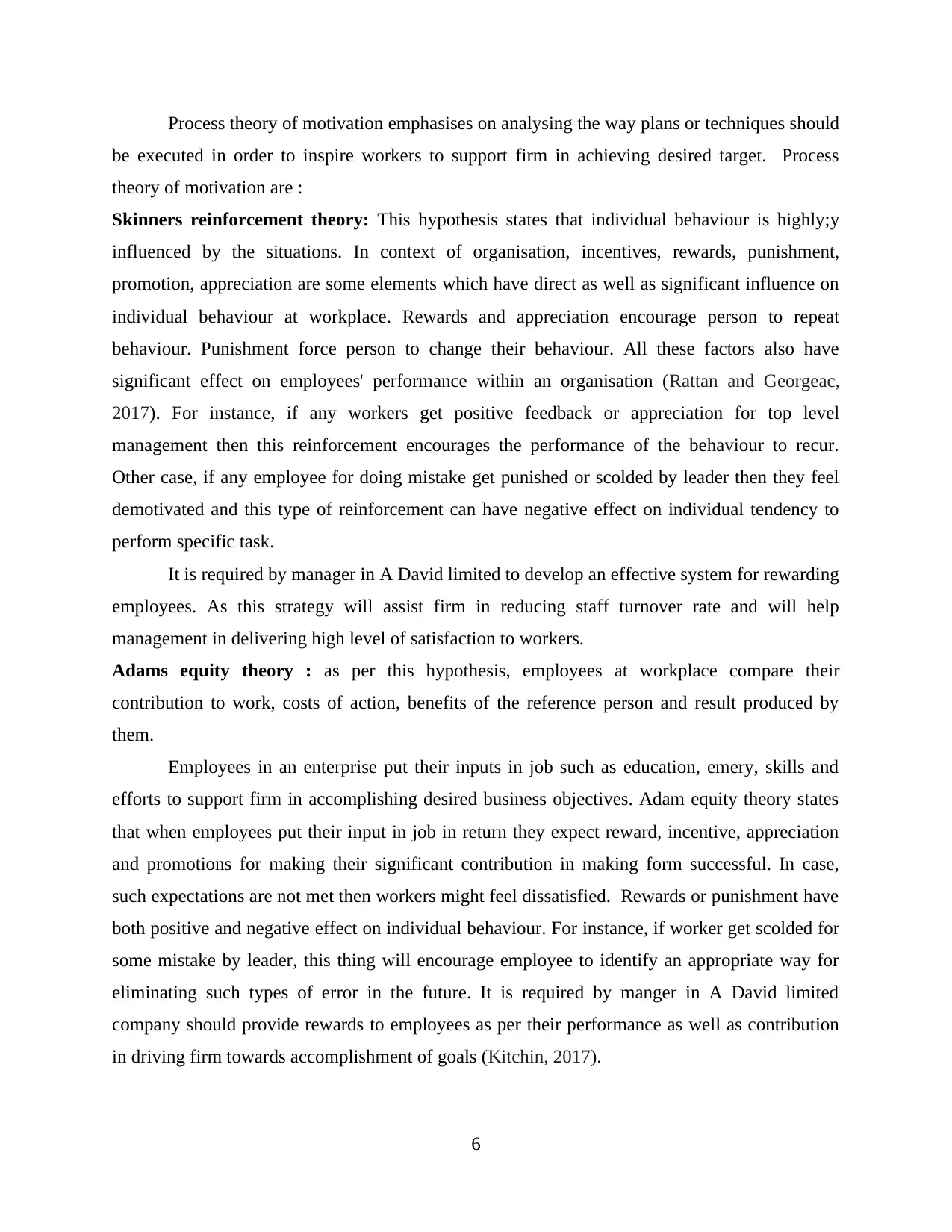
Process theory of motivation emphasises on analysing the way plans or techniques should
be executed in order to inspire workers to support firm in achieving desired target. Process
theory of motivation are :
Skinners reinforcement theory: This hypothesis states that individual behaviour is highly;y
influenced by the situations. In context of organisation, incentives, rewards, punishment,
promotion, appreciation are some elements which have direct as well as significant influence on
individual behaviour at workplace. Rewards and appreciation encourage person to repeat
behaviour. Punishment force person to change their behaviour. All these factors also have
significant effect on employees' performance within an organisation (Rattan and Georgeac,
2017). For instance, if any workers get positive feedback or appreciation for top level
management then this reinforcement encourages the performance of the behaviour to recur.
Other case, if any employee for doing mistake get punished or scolded by leader then they feel
demotivated and this type of reinforcement can have negative effect on individual tendency to
perform specific task.
It is required by manager in A David limited to develop an effective system for rewarding
employees. As this strategy will assist firm in reducing staff turnover rate and will help
management in delivering high level of satisfaction to workers.
Adams equity theory : as per this hypothesis, employees at workplace compare their
contribution to work, costs of action, benefits of the reference person and result produced by
them.
Employees in an enterprise put their inputs in job such as education, emery, skills and
efforts to support firm in accomplishing desired business objectives. Adam equity theory states
that when employees put their input in job in return they expect reward, incentive, appreciation
and promotions for making their significant contribution in making form successful. In case,
such expectations are not met then workers might feel dissatisfied. Rewards or punishment have
both positive and negative effect on individual behaviour. For instance, if worker get scolded for
some mistake by leader, this thing will encourage employee to identify an appropriate way for
eliminating such types of error in the future. It is required by manger in A David limited
company should provide rewards to employees as per their performance as well as contribution
in driving firm towards accomplishment of goals (Kitchin, 2017).
6
be executed in order to inspire workers to support firm in achieving desired target. Process
theory of motivation are :
Skinners reinforcement theory: This hypothesis states that individual behaviour is highly;y
influenced by the situations. In context of organisation, incentives, rewards, punishment,
promotion, appreciation are some elements which have direct as well as significant influence on
individual behaviour at workplace. Rewards and appreciation encourage person to repeat
behaviour. Punishment force person to change their behaviour. All these factors also have
significant effect on employees' performance within an organisation (Rattan and Georgeac,
2017). For instance, if any workers get positive feedback or appreciation for top level
management then this reinforcement encourages the performance of the behaviour to recur.
Other case, if any employee for doing mistake get punished or scolded by leader then they feel
demotivated and this type of reinforcement can have negative effect on individual tendency to
perform specific task.
It is required by manager in A David limited to develop an effective system for rewarding
employees. As this strategy will assist firm in reducing staff turnover rate and will help
management in delivering high level of satisfaction to workers.
Adams equity theory : as per this hypothesis, employees at workplace compare their
contribution to work, costs of action, benefits of the reference person and result produced by
them.
Employees in an enterprise put their inputs in job such as education, emery, skills and
efforts to support firm in accomplishing desired business objectives. Adam equity theory states
that when employees put their input in job in return they expect reward, incentive, appreciation
and promotions for making their significant contribution in making form successful. In case,
such expectations are not met then workers might feel dissatisfied. Rewards or punishment have
both positive and negative effect on individual behaviour. For instance, if worker get scolded for
some mistake by leader, this thing will encourage employee to identify an appropriate way for
eliminating such types of error in the future. It is required by manger in A David limited
company should provide rewards to employees as per their performance as well as contribution
in driving firm towards accomplishment of goals (Kitchin, 2017).
6
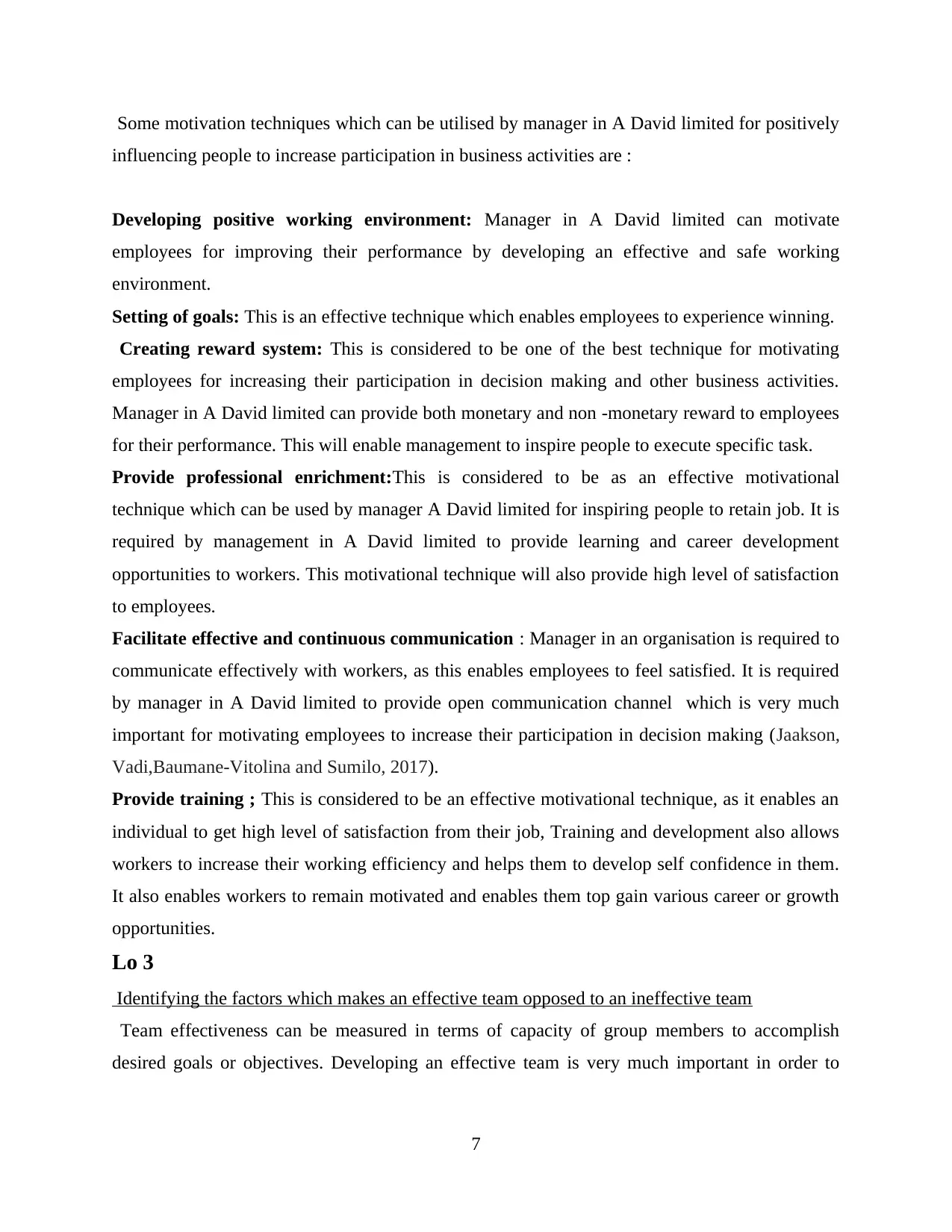
Some motivation techniques which can be utilised by manager in A David limited for positively
influencing people to increase participation in business activities are :
Developing positive working environment: Manager in A David limited can motivate
employees for improving their performance by developing an effective and safe working
environment.
Setting of goals: This is an effective technique which enables employees to experience winning.
Creating reward system: This is considered to be one of the best technique for motivating
employees for increasing their participation in decision making and other business activities.
Manager in A David limited can provide both monetary and non -monetary reward to employees
for their performance. This will enable management to inspire people to execute specific task.
Provide professional enrichment:This is considered to be as an effective motivational
technique which can be used by manager A David limited for inspiring people to retain job. It is
required by management in A David limited to provide learning and career development
opportunities to workers. This motivational technique will also provide high level of satisfaction
to employees.
Facilitate effective and continuous communication : Manager in an organisation is required to
communicate effectively with workers, as this enables employees to feel satisfied. It is required
by manager in A David limited to provide open communication channel which is very much
important for motivating employees to increase their participation in decision making (Jaakson,
Vadi,Baumane-Vitolina and Sumilo, 2017).
Provide training ; This is considered to be an effective motivational technique, as it enables an
individual to get high level of satisfaction from their job, Training and development also allows
workers to increase their working efficiency and helps them to develop self confidence in them.
It also enables workers to remain motivated and enables them top gain various career or growth
opportunities.
Lo 3
Identifying the factors which makes an effective team opposed to an ineffective team
Team effectiveness can be measured in terms of capacity of group members to accomplish
desired goals or objectives. Developing an effective team is very much important in order to
7
influencing people to increase participation in business activities are :
Developing positive working environment: Manager in A David limited can motivate
employees for improving their performance by developing an effective and safe working
environment.
Setting of goals: This is an effective technique which enables employees to experience winning.
Creating reward system: This is considered to be one of the best technique for motivating
employees for increasing their participation in decision making and other business activities.
Manager in A David limited can provide both monetary and non -monetary reward to employees
for their performance. This will enable management to inspire people to execute specific task.
Provide professional enrichment:This is considered to be as an effective motivational
technique which can be used by manager A David limited for inspiring people to retain job. It is
required by management in A David limited to provide learning and career development
opportunities to workers. This motivational technique will also provide high level of satisfaction
to employees.
Facilitate effective and continuous communication : Manager in an organisation is required to
communicate effectively with workers, as this enables employees to feel satisfied. It is required
by manager in A David limited to provide open communication channel which is very much
important for motivating employees to increase their participation in decision making (Jaakson,
Vadi,Baumane-Vitolina and Sumilo, 2017).
Provide training ; This is considered to be an effective motivational technique, as it enables an
individual to get high level of satisfaction from their job, Training and development also allows
workers to increase their working efficiency and helps them to develop self confidence in them.
It also enables workers to remain motivated and enables them top gain various career or growth
opportunities.
Lo 3
Identifying the factors which makes an effective team opposed to an ineffective team
Team effectiveness can be measured in terms of capacity of group members to accomplish
desired goals or objectives. Developing an effective team is very much important in order to
7
⊘ This is a preview!⊘
Do you want full access?
Subscribe today to unlock all pages.

Trusted by 1+ million students worldwide
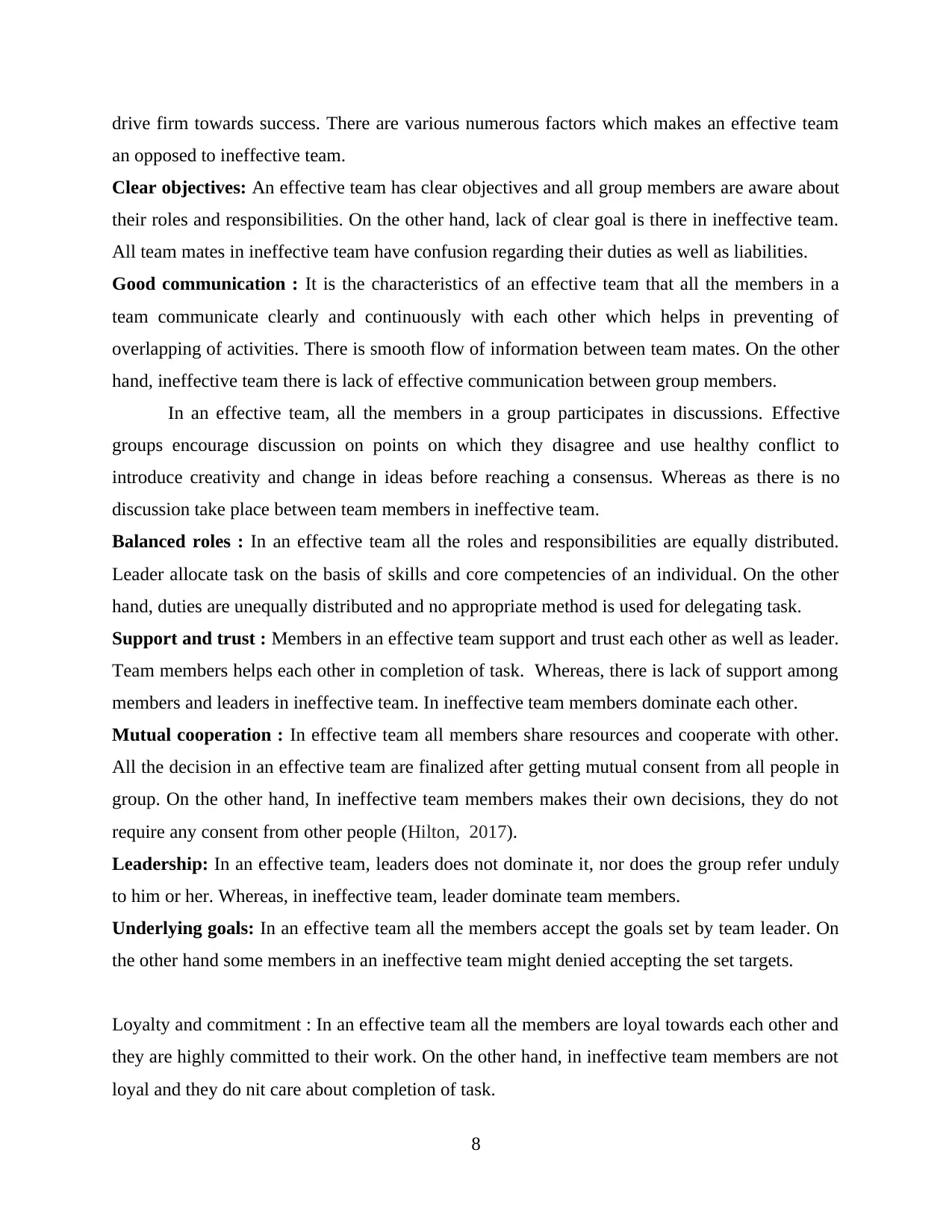
drive firm towards success. There are various numerous factors which makes an effective team
an opposed to ineffective team.
Clear objectives: An effective team has clear objectives and all group members are aware about
their roles and responsibilities. On the other hand, lack of clear goal is there in ineffective team.
All team mates in ineffective team have confusion regarding their duties as well as liabilities.
Good communication : It is the characteristics of an effective team that all the members in a
team communicate clearly and continuously with each other which helps in preventing of
overlapping of activities. There is smooth flow of information between team mates. On the other
hand, ineffective team there is lack of effective communication between group members.
In an effective team, all the members in a group participates in discussions. Effective
groups encourage discussion on points on which they disagree and use healthy conflict to
introduce creativity and change in ideas before reaching a consensus. Whereas as there is no
discussion take place between team members in ineffective team.
Balanced roles : In an effective team all the roles and responsibilities are equally distributed.
Leader allocate task on the basis of skills and core competencies of an individual. On the other
hand, duties are unequally distributed and no appropriate method is used for delegating task.
Support and trust : Members in an effective team support and trust each other as well as leader.
Team members helps each other in completion of task. Whereas, there is lack of support among
members and leaders in ineffective team. In ineffective team members dominate each other.
Mutual cooperation : In effective team all members share resources and cooperate with other.
All the decision in an effective team are finalized after getting mutual consent from all people in
group. On the other hand, In ineffective team members makes their own decisions, they do not
require any consent from other people (Hilton, 2017).
Leadership: In an effective team, leaders does not dominate it, nor does the group refer unduly
to him or her. Whereas, in ineffective team, leader dominate team members.
Underlying goals: In an effective team all the members accept the goals set by team leader. On
the other hand some members in an ineffective team might denied accepting the set targets.
Loyalty and commitment : In an effective team all the members are loyal towards each other and
they are highly committed to their work. On the other hand, in ineffective team members are not
loyal and they do nit care about completion of task.
8
an opposed to ineffective team.
Clear objectives: An effective team has clear objectives and all group members are aware about
their roles and responsibilities. On the other hand, lack of clear goal is there in ineffective team.
All team mates in ineffective team have confusion regarding their duties as well as liabilities.
Good communication : It is the characteristics of an effective team that all the members in a
team communicate clearly and continuously with each other which helps in preventing of
overlapping of activities. There is smooth flow of information between team mates. On the other
hand, ineffective team there is lack of effective communication between group members.
In an effective team, all the members in a group participates in discussions. Effective
groups encourage discussion on points on which they disagree and use healthy conflict to
introduce creativity and change in ideas before reaching a consensus. Whereas as there is no
discussion take place between team members in ineffective team.
Balanced roles : In an effective team all the roles and responsibilities are equally distributed.
Leader allocate task on the basis of skills and core competencies of an individual. On the other
hand, duties are unequally distributed and no appropriate method is used for delegating task.
Support and trust : Members in an effective team support and trust each other as well as leader.
Team members helps each other in completion of task. Whereas, there is lack of support among
members and leaders in ineffective team. In ineffective team members dominate each other.
Mutual cooperation : In effective team all members share resources and cooperate with other.
All the decision in an effective team are finalized after getting mutual consent from all people in
group. On the other hand, In ineffective team members makes their own decisions, they do not
require any consent from other people (Hilton, 2017).
Leadership: In an effective team, leaders does not dominate it, nor does the group refer unduly
to him or her. Whereas, in ineffective team, leader dominate team members.
Underlying goals: In an effective team all the members accept the goals set by team leader. On
the other hand some members in an ineffective team might denied accepting the set targets.
Loyalty and commitment : In an effective team all the members are loyal towards each other and
they are highly committed to their work. On the other hand, in ineffective team members are not
loyal and they do nit care about completion of task.
8
Paraphrase This Document
Need a fresh take? Get an instant paraphrase of this document with our AI Paraphraser
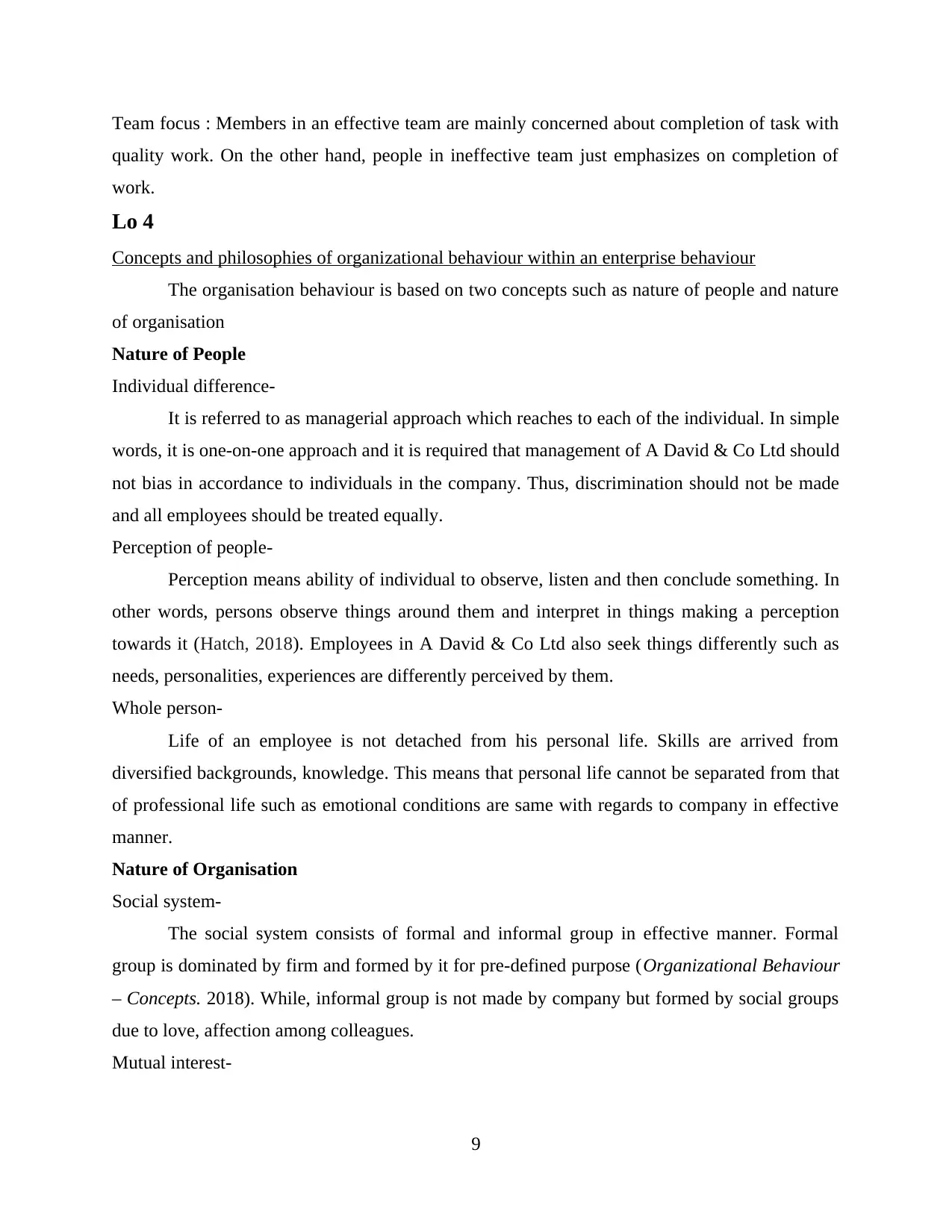
Team focus : Members in an effective team are mainly concerned about completion of task with
quality work. On the other hand, people in ineffective team just emphasizes on completion of
work.
Lo 4
Concepts and philosophies of organizational behaviour within an enterprise behaviour
The organisation behaviour is based on two concepts such as nature of people and nature
of organisation
Nature of People
Individual difference-
It is referred to as managerial approach which reaches to each of the individual. In simple
words, it is one-on-one approach and it is required that management of A David & Co Ltd should
not bias in accordance to individuals in the company. Thus, discrimination should not be made
and all employees should be treated equally.
Perception of people-
Perception means ability of individual to observe, listen and then conclude something. In
other words, persons observe things around them and interpret in things making a perception
towards it (Hatch, 2018). Employees in A David & Co Ltd also seek things differently such as
needs, personalities, experiences are differently perceived by them.
Whole person-
Life of an employee is not detached from his personal life. Skills are arrived from
diversified backgrounds, knowledge. This means that personal life cannot be separated from that
of professional life such as emotional conditions are same with regards to company in effective
manner.
Nature of Organisation
Social system-
The social system consists of formal and informal group in effective manner. Formal
group is dominated by firm and formed by it for pre-defined purpose (Organizational Behaviour
– Concepts. 2018). While, informal group is not made by company but formed by social groups
due to love, affection among colleagues.
Mutual interest-
9
quality work. On the other hand, people in ineffective team just emphasizes on completion of
work.
Lo 4
Concepts and philosophies of organizational behaviour within an enterprise behaviour
The organisation behaviour is based on two concepts such as nature of people and nature
of organisation
Nature of People
Individual difference-
It is referred to as managerial approach which reaches to each of the individual. In simple
words, it is one-on-one approach and it is required that management of A David & Co Ltd should
not bias in accordance to individuals in the company. Thus, discrimination should not be made
and all employees should be treated equally.
Perception of people-
Perception means ability of individual to observe, listen and then conclude something. In
other words, persons observe things around them and interpret in things making a perception
towards it (Hatch, 2018). Employees in A David & Co Ltd also seek things differently such as
needs, personalities, experiences are differently perceived by them.
Whole person-
Life of an employee is not detached from his personal life. Skills are arrived from
diversified backgrounds, knowledge. This means that personal life cannot be separated from that
of professional life such as emotional conditions are same with regards to company in effective
manner.
Nature of Organisation
Social system-
The social system consists of formal and informal group in effective manner. Formal
group is dominated by firm and formed by it for pre-defined purpose (Organizational Behaviour
– Concepts. 2018). While, informal group is not made by company but formed by social groups
due to love, affection among colleagues.
Mutual interest-
9
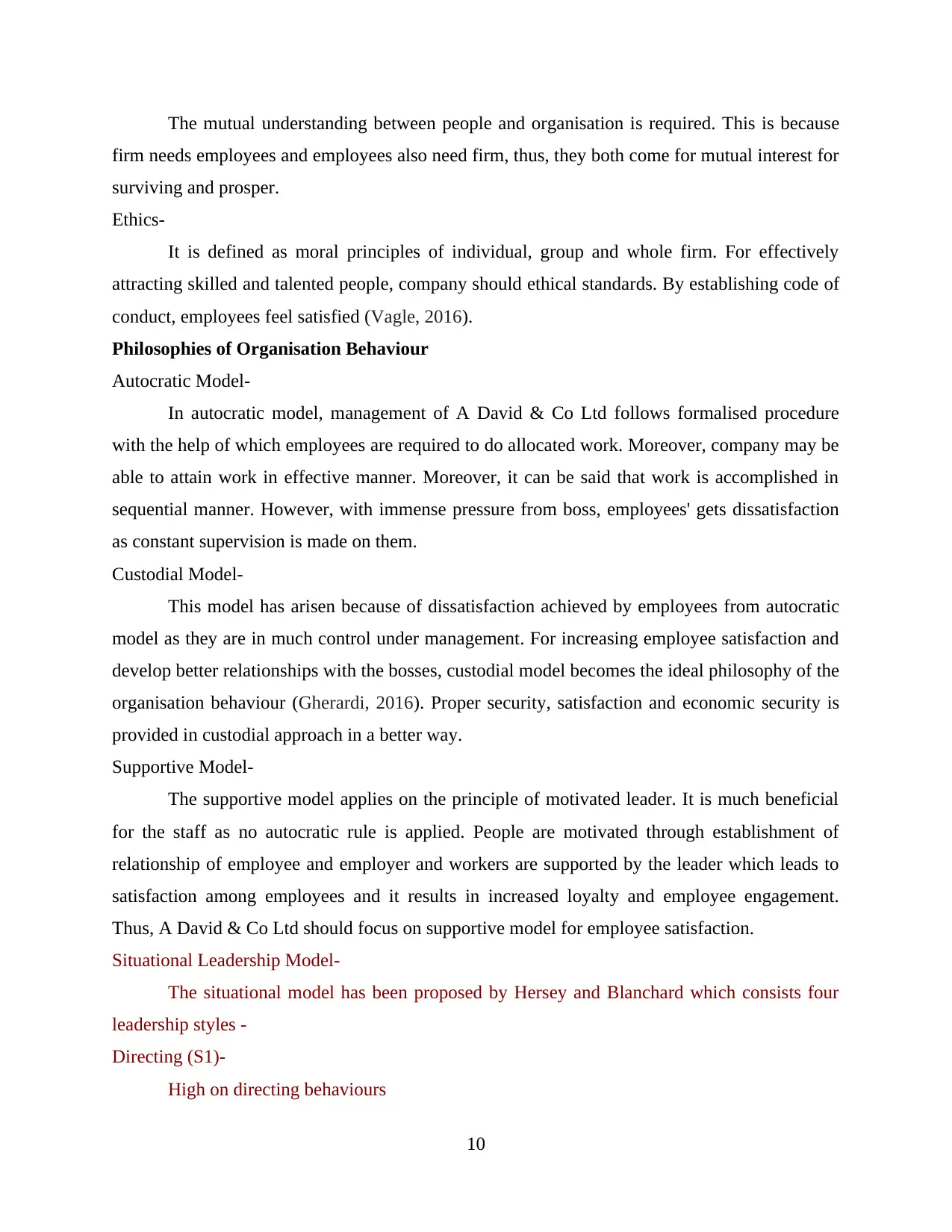
The mutual understanding between people and organisation is required. This is because
firm needs employees and employees also need firm, thus, they both come for mutual interest for
surviving and prosper.
Ethics-
It is defined as moral principles of individual, group and whole firm. For effectively
attracting skilled and talented people, company should ethical standards. By establishing code of
conduct, employees feel satisfied (Vagle, 2016).
Philosophies of Organisation Behaviour
Autocratic Model-
In autocratic model, management of A David & Co Ltd follows formalised procedure
with the help of which employees are required to do allocated work. Moreover, company may be
able to attain work in effective manner. Moreover, it can be said that work is accomplished in
sequential manner. However, with immense pressure from boss, employees' gets dissatisfaction
as constant supervision is made on them.
Custodial Model-
This model has arisen because of dissatisfaction achieved by employees from autocratic
model as they are in much control under management. For increasing employee satisfaction and
develop better relationships with the bosses, custodial model becomes the ideal philosophy of the
organisation behaviour (Gherardi, 2016). Proper security, satisfaction and economic security is
provided in custodial approach in a better way.
Supportive Model-
The supportive model applies on the principle of motivated leader. It is much beneficial
for the staff as no autocratic rule is applied. People are motivated through establishment of
relationship of employee and employer and workers are supported by the leader which leads to
satisfaction among employees and it results in increased loyalty and employee engagement.
Thus, A David & Co Ltd should focus on supportive model for employee satisfaction.
Situational Leadership Model-
The situational model has been proposed by Hersey and Blanchard which consists four
leadership styles -
Directing (S1)-
High on directing behaviours
10
firm needs employees and employees also need firm, thus, they both come for mutual interest for
surviving and prosper.
Ethics-
It is defined as moral principles of individual, group and whole firm. For effectively
attracting skilled and talented people, company should ethical standards. By establishing code of
conduct, employees feel satisfied (Vagle, 2016).
Philosophies of Organisation Behaviour
Autocratic Model-
In autocratic model, management of A David & Co Ltd follows formalised procedure
with the help of which employees are required to do allocated work. Moreover, company may be
able to attain work in effective manner. Moreover, it can be said that work is accomplished in
sequential manner. However, with immense pressure from boss, employees' gets dissatisfaction
as constant supervision is made on them.
Custodial Model-
This model has arisen because of dissatisfaction achieved by employees from autocratic
model as they are in much control under management. For increasing employee satisfaction and
develop better relationships with the bosses, custodial model becomes the ideal philosophy of the
organisation behaviour (Gherardi, 2016). Proper security, satisfaction and economic security is
provided in custodial approach in a better way.
Supportive Model-
The supportive model applies on the principle of motivated leader. It is much beneficial
for the staff as no autocratic rule is applied. People are motivated through establishment of
relationship of employee and employer and workers are supported by the leader which leads to
satisfaction among employees and it results in increased loyalty and employee engagement.
Thus, A David & Co Ltd should focus on supportive model for employee satisfaction.
Situational Leadership Model-
The situational model has been proposed by Hersey and Blanchard which consists four
leadership styles -
Directing (S1)-
High on directing behaviours
10
⊘ This is a preview!⊘
Do you want full access?
Subscribe today to unlock all pages.

Trusted by 1+ million students worldwide
1 out of 16
Related Documents
Your All-in-One AI-Powered Toolkit for Academic Success.
+13062052269
info@desklib.com
Available 24*7 on WhatsApp / Email
![[object Object]](/_next/static/media/star-bottom.7253800d.svg)
Unlock your academic potential
Copyright © 2020–2026 A2Z Services. All Rights Reserved. Developed and managed by ZUCOL.





